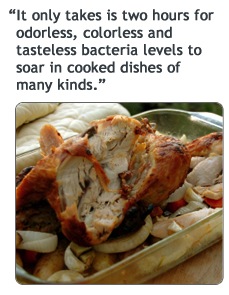
After you’ve fussed over your holiday feast, using favorite recipes and the best ingredients, you and your family can sit back and enjoy yummy leftovers for days and days to come, right? Wait a minute! Before you dive into yesterday’s turkey, dressing, mashed potatoes, custard pie and other goodies, be aware these goodies can smell and look delicious – and still make you sick to your stomach – if they aren’t stored and reheated safely.
The reason, food safety specialists explain, is that it’s easy to leave cooked foods at room temperature a bit too long. It only takes is two hours for odorless, colorless and tasteless but capable-of-causing-illness bacteria levels to soar in cooked dishes of many kinds. Eating this bacteria contaminated food can cause everything from a mild upset stomach to serious food poisoning.
You might normally be wary of a shrimp cocktail if you left it out in a warm kitchen counter for a few hours. However the truth is, even starchy vegetables like simple mashed potatoes can move into the potentially dangerous zone of bacterial growth if left at temperatures between 40 and 140 degrees Fahrenheit for more than two hours. In fact, according to the Center for Science in the Public Interest (CSPI), if a single bacterium has nutrients, moisture and is warm enough, it can multiple into 17 million bacteria in half a day.

All of these warnings don’t mean you need to fear your leftovers or throw them out, however. “Leftovers the next day can be a lovely reminder of the meal you shared with loved ones,” says food scientist Kantha Shelke, PhD, a spokesperson for the Institute of Food Technologists (IFT), and principal of Corvus Blue, a Chicago-based food science and research firm. “They’re also a great way to stretch your food budget. Properly handling and storing leftovers can help ensure your family gets the most value and enjoyment out of the food you’ve prepared.”
Chill food promptly after cooking and then place it in the refrigerator. Shelke explains that the temperature in your refrigerator should be at 40 degrees Fahrenheit or lower (to be positive, use an appliance thermometer rather than relying on refrigerator controls and displays). Freshly cooked food should be put in the refrigerator when it has reached a temperature of 90 to 100 degrees Fahrenheit – usually, that’s when the dish feels just warm to the touch.
In order to cool food off quickly, you can chill it briefly in a pan of cold water or sit it in front of a fan. It also helps to divide hot leftovers into smaller portions that can be placed into shallow containers. Bottom line: store leftovers as quickly as possible, always within two hours of cooking.
Store leftovers properly.Using storage containers, ceramic dishes or disposable wrap to store your leftovers is a matter of personal preference, according to Shelke. She notes that thin-walled metal, glass or plastic containers that are no more than two inches deep are ideal for storage -- the shallow size helps warm food continue to cool off quickly in the fridge. Bags, foil and plastic wrap work well for food that is large or oddly shaped.
You can store turkey, ham and other cooked meat safely in the refrigerator for three to four days. That doesn’t mean it’s safe to stick the whole leftover side of an uncarved turkey in there, however. The safest strategy is to take the turkey meat off the bones, then store it in multiple, small containers.

If you have any uncooked ground meats, poultry and seafood on hand, they should be used in a day or two. Raw roasts, steaks and chops (beef, veal, lamp or pork) can be refrigerated safely before using for about three to five days. When it comes to vegetable side dishes, casseroles and pies, food expert Shelke says they are usually fine to store refrigerated for three to five days. However, stuffing and gravy go bad more quickly than most other holiday favorites so eat them in about two days – or toss them out.
If your holiday feast has produced a lot of leftovers, freezing them could make the most sense. Your freezer temperature should be at 0 degrees Fahrenheit -- that degree of cold puts the brakes on bacterial activity, so food can stay safe and usable for months while frozen. Uncooked meats can last 8 to 12 months in the freezer, according to Shelke; frozen cooked meats will begin to lose their flavor after three months.
Rules for reheating.Food safety experts recommend re-heating leftovers to at least 165 degreesFahrenheitto eliminate dangerous bacteria. So,when it’s time to serve your holiday leftovers again, using a thermometer is the best way to make sure they’ve been heated to a safe temperature.
Meat should be heated to 165 Fahrenheit in the center and sauces, soups and gravies need to reach a boil and then be stirred. Never reheat leftovers in crock pots, slow cookers or chafing dishes – the food won’t get hot enough to kill bacteria thoroughly. When reheating in a microwave, use a lower power setting for a longer time to reheat thoroughly without overcooking.
Once you’ve frozen your leftovers and then want to serve them in several weeks or months, remember that as they defrost, bacteria can grow. Thaw frozen food safely in the refrigerator, under cold running water, or in the microwave – but never at room temperature. Once thawed, cook previously frozen meat immediately.
What to do if you aren’t sure about leftovers.Maybe you aren’t exactly sure how long a dish has been in the fridge. Don't be tempted to taste food that looks or smells questionable. Remember this sage advice from food experts: when in doubt, throw it out!
For additional food safety advice and tips, visitFoodSafety.gov, a gateway site for federal food safety information. If you have questions about the storage, handling and preparation of meats, poultry and eggs, get the facts you need by calling the free USDA Meat and Poultry Hotline, 1-888-674-6854.
|